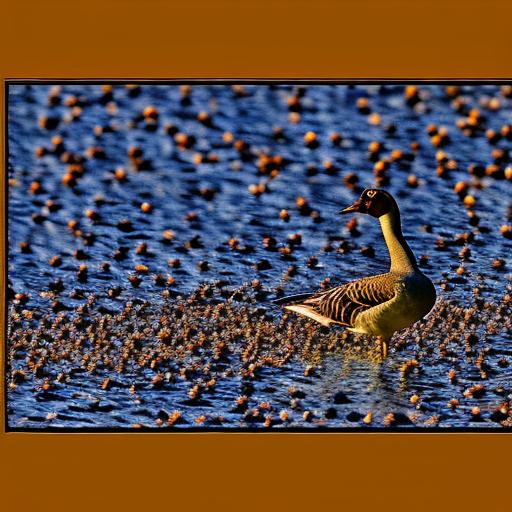Growing your own blueberries can be a rewarding experience. The satisfaction of watching the plants grow and the anticipation of harvesting the sweet, juicy berries is unmatched. However, there is one frustrating obstacle that many blueberry growers face – geese. These birds have a voracious appetite for blueberries and can quickly decimate a crop if not properly managed. Fortunately, there are several methods that can be used to protect your blueberry plants from geese.
Key Takeaways
- Geese are attracted to blueberries because they are a high-energy food source.
- Physical barriers like fences or chicken wire can be effective in keeping geese away from blueberry plants.
- Netting can also be used to protect blueberries, but it must be secured tightly to prevent geese from getting tangled.
- Planting decoy crops like clover or wheat can distract geese from eating blueberries.
- Motion-activated deterrents like sprinklers or flashing lights can scare geese away from blueberry plants.
Understanding the behavior of geese and blueberries
Geese are attracted to blueberries for several reasons. First, blueberries are a delicious and nutritious food source for them. The sweet taste and high water content make them an ideal snack. Additionally, blueberries are often found near bodies of water, which is where geese naturally congregate. This proximity makes it easy for them to access blueberry plants.
To deter geese from your blueberry plants, it is important to understand their behavior. Geese are social animals that prefer to be in groups. They are also territorial and will defend their feeding areas from other geese. By understanding these behaviors, you can implement strategies to deter geese from your blueberry plants.
Creating a physical barrier to protect your blueberry plants
One effective method of protecting your blueberry plants from geese is by creating a physical barrier. There are several types of barriers that can be used, including fences, netting, and chicken wire.
Fences can be constructed around the perimeter of your blueberry patch to prevent geese from accessing the plants. The fence should be at least 3 feet high and buried at least 6 inches into the ground to prevent geese from going under it. Regular maintenance is required to ensure that the fence remains intact and secure.
Netting is another option for protecting your blueberry plants. It can be draped over the plants to create a barrier that prevents geese from reaching the berries. The netting should be secured tightly to prevent geese from getting tangled in it. Regular inspections and repairs are necessary to ensure that the netting remains effective.
Chicken wire can also be used to create a physical barrier. It can be placed around the base of the blueberry plants to prevent geese from accessing them. The chicken wire should be buried at least 6 inches into the ground to prevent geese from going under it. Regular maintenance is required to ensure that the chicken wire remains intact and secure.
Using netting to deter geese from accessing your blueberries
Netting is a popular method for deterring geese from accessing blueberries. It is an effective way to protect your plants without harming the birds. Netting creates a physical barrier that prevents geese from reaching the berries.
To properly install netting, start by measuring the area you need to cover. Cut the netting to size, leaving some extra material on each side for securing it. Use stakes or weights to anchor the netting to the ground, making sure it is taut and secure. Regular inspections and repairs are necessary to ensure that the netting remains effective.
Netting has several benefits. It is a cost-effective solution that can be easily installed and removed as needed. It also allows sunlight and rain to reach the plants, ensuring their health and growth. However, it is important to regularly check the netting for any trapped birds or other wildlife and release them safely.
Planting decoy crops to distract geese from your blueberries
Another method for deterring geese from your blueberry plants is by planting decoy crops. These are crops that are more attractive to geese than blueberries and can serve as a distraction.
Some crops that are commonly used as decoys include corn, wheat, and rye grass. These crops have a high carbohydrate content, which is appealing to geese. By planting these crops near your blueberry plants, you can redirect the geese’s attention away from your berries.
It is important to regularly maintain and monitor the decoy crops. This includes watering, fertilizing, and protecting them from pests. By keeping the decoy crops healthy and attractive, you increase the chances of geese being drawn to them instead of your blueberries.
Installing motion-activated deterrents to scare geese away

Motion-activated deterrents are another effective method for deterring geese from your blueberry plants. These devices use motion sensors to detect the presence of geese and emit a loud noise or spray of water to scare them away.
To properly install motion-activated deterrents, place them strategically around your blueberry plants. Make sure they are positioned in areas where geese are likely to approach. Regular maintenance is required to ensure that the deterrents are functioning properly and have fresh batteries or a water supply.
Motion-activated deterrents have several benefits. They are a humane way to deter geese without causing harm to them or the environment. They are also effective in scaring geese away, as the sudden noise or spray of water startles them and encourages them to leave the area.
Using sound deterrents to keep geese at bay
Sound deterrents are another method for keeping geese away from your blueberry plants. These devices emit loud noises or predator calls that mimic the sounds of natural predators, such as birds of prey.
To properly install sound deterrents, place them strategically around your blueberry plants. Make sure they are positioned in areas where geese are likely to approach. Regular maintenance is required to ensure that the deterrents are functioning properly and have fresh batteries or a power source.
Sound deterrents have several benefits. They are a non-lethal way to deter geese and do not harm the birds or the environment. They are also effective in keeping geese at bay, as the sounds mimic the presence of predators and create a sense of danger for the geese.
Employing trained dogs to chase geese away from your blueberries
Trained dogs can be a highly effective method for deterring geese from your blueberry plants. Dogs have a natural instinct to chase and herd animals, and their presence can be enough to scare geese away.
To properly employ trained dogs, it is important to work with a professional dog trainer who specializes in bird control. The trainer will teach the dog how to effectively chase and deter geese without causing harm to them or the environment. Regular training sessions and maintenance are necessary to ensure that the dog remains effective in deterring geese.
Trained dogs have several benefits. They are a natural and non-lethal way to deter geese, as their presence alone is often enough to scare the birds away. They also provide a long-term solution, as they can be trained to patrol the area regularly and keep geese at bay.
Applying bird repellent sprays to your blueberry plants
Bird repellent sprays can be used as a deterrent to keep geese away from your blueberry plants. These sprays contain natural ingredients that create an unpleasant taste or smell for the birds, discouraging them from feeding on the plants.
To properly apply bird repellent sprays, follow the instructions on the product label. Spray the solution evenly on your blueberry plants, making sure to cover all parts of the plant that are vulnerable to geese feeding. Regular reapplication is necessary, especially after rain or heavy watering.
Bird repellent sprays have several benefits. They are a non-lethal way to deter geese and do not harm the birds or the environment. They are also easy to use and can be applied directly to the plants without causing any damage.
Harvesting blueberries before they become too tempting to geese
One of the simplest and most effective methods for protecting your blueberry plants from geese is by harvesting the berries before they become too tempting. Geese are attracted to ripe, juicy berries, so by picking them early, you can reduce the likelihood of geese feeding on your plants.
To properly harvest blueberries, wait until they are fully ripe and easily detach from the plant with a gentle tug. Use a clean container to collect the berries, being careful not to crush or bruise them. Regular harvesting is necessary to ensure that the berries are picked at their peak ripeness and do not become overripe and attractive to geese.
Harvesting blueberries early has several benefits. It reduces the risk of geese feeding on your plants and allows you to enjoy the fruits of your labor before they are consumed by wildlife. It also promotes the health and productivity of your blueberry plants, as regular harvesting encourages new growth and fruit production.
Collaborating with your community to manage the geese population in your area
Managing the geese population in your area can be a collaborative effort with your community. By working together, you can implement strategies that deter geese from your blueberry plants and create a more harmonious environment for both humans and wildlife.
To properly collaborate with your community, start by reaching out to local organizations or government agencies that specialize in wildlife management. They can provide guidance and resources on how to effectively manage the geese population in your area. Regular communication and coordination with these organizations are necessary to ensure that everyone is working towards a common goal.
Collaborating with your community has several benefits. It allows for a more comprehensive approach to managing the geese population, as multiple strategies can be implemented simultaneously. It also fosters a sense of community and shared responsibility for protecting the environment and preserving natural resources.
Protecting your blueberry plants from geese can be a challenging task, but with the right methods and strategies, it is possible to deter these birds and enjoy a bountiful harvest. From physical barriers to sound deterrents, there are numerous options available to suit your needs and preferences. It may take some trial and error to find the most effective method for your specific situation, but with perseverance and patience, you can successfully protect your blueberry plants from geese and enjoy the fruits of your labor.
If you’re wondering how to keep geese from eating your blueberries, you might find this article on poultrywizard.com interesting. It discusses the number of eggs geese lay and provides valuable insights into breeding geese. Understanding their reproductive patterns can help you devise strategies to protect your blueberry bushes. Check out the article here for more information. Additionally, if you’re considering keeping chickens in your garden as a natural deterrent for geese, this article on garden chicken coops might be of interest. It offers tips on creating a safe and productive environment for both your chickens and your blueberries.
FAQs
What are some common methods to keep geese away from blueberries?
Some common methods to keep geese away from blueberries include using bird netting, scare tactics such as decoys or noise makers, and planting alternative food sources for the geese.
What is bird netting and how does it work?
Bird netting is a physical barrier made of mesh material that is placed over blueberry bushes to prevent geese from accessing the fruit. The netting is typically secured to the ground with stakes or weights to prevent birds from getting underneath.
What are some effective scare tactics to keep geese away from blueberries?
Effective scare tactics to keep geese away from blueberries include using decoys such as fake predators or reflective tape, noise makers such as propane cannons or air horns, and visual deterrents such as balloons or streamers.
What are some alternative food sources that can be planted to distract geese from blueberries?
Alternative food sources that can be planted to distract geese from blueberries include grasses, grains, and other crops that are less desirable to geese. Some examples include wheat, oats, and rye.
Are there any humane methods to keep geese away from blueberries?
Yes, there are humane methods to keep geese away from blueberries. These include using bird netting, planting alternative food sources, and using scare tactics that do not harm the geese. It is important to avoid using methods that could cause harm or distress to the birds.
Meet Walter, the feathered-friend fanatic of Florida! Nestled in the sunshine state, Walter struts through life with his feathered companions, clucking his way to happiness. With a coop that’s fancier than a five-star hotel, he’s the Don Juan of the chicken world. When he’s not teaching his hens to do the cha-cha, you’ll find him in a heated debate with his prized rooster, Sir Clucks-a-Lot. Walter’s poultry passion is no yolk; he’s the sunny-side-up guy you never knew you needed in your flock of friends!







